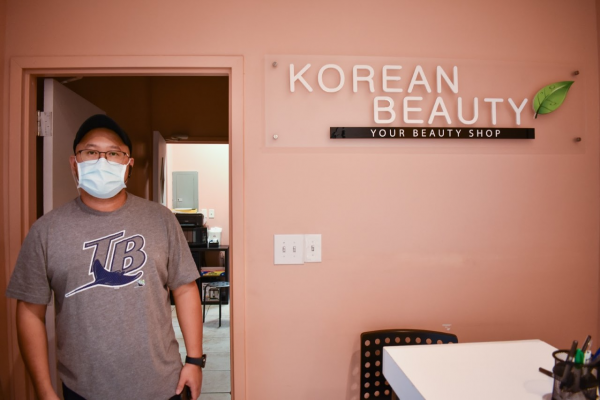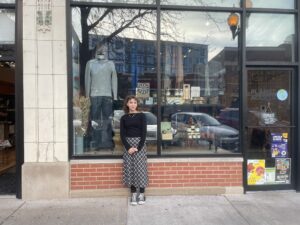Historically, Cermak Road between Wentworth and Clark streets has been the pulsing heartbeat of Chinatown. Crammed streets, the cacophony of Chinese, English and other languages as visitors pass by storefronts—some with a duck or chicken in the window—and the aromas of Chinese cuisine have helped maintain the rhythm of the thriving community.
But recently, the once thriving pulse of stores like Korean Beauty, a cosmetics shop that, like many other restaurants and stores, is fighting for survival, has slowed in the midst of the COVID-19 pandemic.
Inside, the store remains mostly empty, with the exception of only a few customers walking in, then quickly out. The street outside is bare as many try to keep their distance from one another.

Tony Zhang, 30, has owned Korean Beauty located in Chinatown Square Plaza for the past five years, and his store is one of many that still suffer the consequences of the pandemic.
“I’ve lost a lot of business because of the situation right now, more than 50 percent,” Zhang said. “[Because of the loss of business], we are trying to do more online and we offer more discounts and gifts to stimulate business.”
He also said that other shops around his store have lost similar business.
Chinatown restaurants and neighboring businesses have been hit hard by a state-imposed indoor dining ban. In addition, Chinese-Americans and Chinese owned businesses have been targeted racially, including remarks from outgoing President Donald Trump, who has repeatedly called COVID-19 the “Chinese Virus.”
Korean Beauty has not escaped racial discrimination.
“Our store has never been crashed by anyone, but sometimes there are customers who don’t wear [a] mask,” Zhang said. “[One day] when we told someone to wear one, they said some really offensive [and] racist words that made us really upset.”
Henna Hakala, a 19-year-old frequent shopper, said she remembers how Chinatown was always so lively and filled with people before the pandemic.
“But now it’s really sad to see all the stores closing down and losing business,” Hakala said. “I think we really need to come together as a community to help.”
Despite the many challenges, members of the community have taken the initiative to help Chinese-owned businesses. On the Chinatown Chamber of Commerce website, there is a donation page where individuals can donate money to help struggling businesses. The site also provides information about seminars for business owners, offers digital assistance in answering questions and in filling out forms and helps businesses navigate the various loans that are available.
“We’ve been focusing on helping the small businesses go through this hard time, especially when the cold weather hits,” said Emma Yu, the executive director of the Chicago Chinatown Chamber of Commerce.
But even with the continued advocacy of community support, businesses still suffer, streets remain empty and many owners continue to struggle.
“It’s [been] a disaster for all of us,” Zhang said. “The pandemic has really brought us a lot [of] negative influence.”
— Special thanks to Columbia junior Quizhang Zhang for providing interview translations.












Be First to Comment